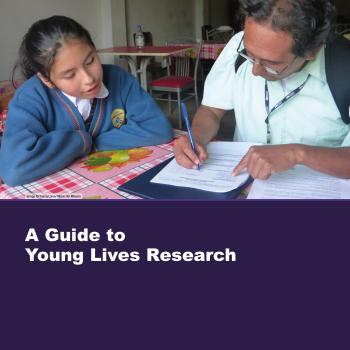
Young Lives has been the first multi-disciplinary longitudinal study of childhood poverty to be carried out in more than one developing country.
Drawing on the practical experiences of our research teams, the Guide to Young Lives Research provides an overview of how the Young Lives study has been carried out, giving insight into the diverse methods and processes involved in a complex longitudinal study made up of many different components. It offers lessons on building and managing research partnerships, designing and conducting multidisciplinary research, managing and analysing data, and using research to influence policy.
Reflecting on 15 years of experience, each section summarises a different part of the research process, considering:
what has been done in each area what challenges have arisen how ways of working have changed and developed what lessons have been learned.
Each section of the Guide is also available to download separately.
Contents Young Lives: Study Overview What Can Comparative Country Research Tell Us About Child Poverty? What Can Longitudinal Research Tell Us About Children's Life-chances? Research Ethics Sampling Child, Household and Community Surveys Qualitative Longitudinal Research School Surveys Sub-studies Piloting: Testing Instruments and Training Field Teams Planning and Managing Fieldwork Cohort Maintenance: Tracking and Attrition Computer-assisted Personal Interviewing Methods for Analysis

Young Lives has been the first multi-disciplinary longitudinal study of childhood poverty to be carried out in more than one developing country.
Drawing on the practical experiences of our research teams, the Guide to Young Lives Research provides an overview of how the Young Lives study has been carried out, giving insight into the diverse methods and processes involved in a complex longitudinal study made up of many different components. It offers lessons on building and managing research partnerships, designing and conducting multidisciplinary research, managing and analysing data, and using research to influence policy.
Reflecting on 15 years of experience, each section summarises a different part of the research process, considering:
what has been done in each area what challenges have arisen how ways of working have changed and developed what lessons have been learned.
Each section of the Guide is also available to download separately.
Contents Young Lives: Study Overview What Can Comparative Country Research Tell Us About Child Poverty? What Can Longitudinal Research Tell Us About Children's Life-chances? Research Ethics Sampling Child, Household and Community Surveys Qualitative Longitudinal Research School Surveys Sub-studies Piloting: Testing Instruments and Training Field Teams Planning and Managing Fieldwork Cohort Maintenance: Tracking and Attrition Computer-assisted Personal Interviewing Methods for Analysis

